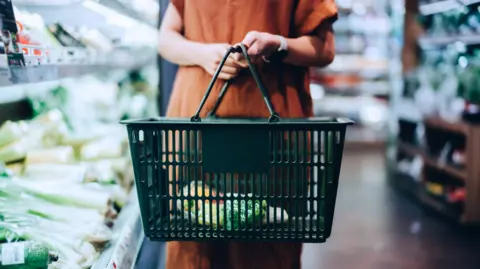Food price rises 'returning to normal'
 Getty Images
Getty ImagesFood price rises are returning to "more normal" rates, research suggests, although shoppers are still seeking out cheaper own-brand goods.
Grocery price inflation - the rate at which prices increase - has fallen to 2.4%, according to research firm Kantar, the lowest since October 2021.
The findings come ahead of official figures due on Wednesday which are expected to show a sharp drop in overall inflation.
The easing of price rises has raised expectations that the Bank of England will cut interest rates this summer.
Kantar said that despite the easing of food price rises, shoppers were still following money-saving habits.
"Typically, an inflation rate of around 3% is when we start to see marked changes in consumers’ behaviour, with shoppers trading down to cheaper items when the rate goes above this line and vice versa when the rate drops," said Fraser McKevitt, head of retail and consumer insight at Kantar.
"However, after nearly two and a half years of rapidly rising prices, it could take a bit longer for shoppers to unwind the habits they have learnt to help them manage the cost of living crisis.
"Own-label lines are proving resilient, for example, and they are still growing faster than brands, making up over half (52%) of total spending."
Sales of premium own-label ranges remained popular, up by 9.9% from a year earlier.
Kantar also said it expected summer sports events such as the Euro 2024 men’s football tournament and the Olympic Games to boost sales, especially alcoholic drinks.
"During England’s quarter final match against France in the 2022 FIFA Men’s World Cup, take-home beer sales hit their biggest daily takings of the year outside of Christmas," Mr McKevitt said.
Overall inflation peaked at 11.1% in late 2022, but increases in prices for food and non-alcoholic drinks were running at a rate of almost 20% last year - the highest since the 1970s.
In response, the Bank of England increased interest rates in a bid to slow price rises.
The theory is that if you make borrowing more expensive, people have less money to spend, or may choose to save more as saving rates go up. This in turn reduces demand for goods and helps cool inflation.
The Bank's key rate now stands at 5.25% - a 16-year high - but as inflation has fallen there has been intense speculation over when the rate will be cut.
The most recent inflation data showed that prices rose by 3.2% in the year to March, although the figure released on Wednesday is expected to see the rate drop close to the Bank's target of 2%.
On Monday, Bank deputy governor Ben Broadbent said that a rate cut at "some time" over the summer was "possible".
